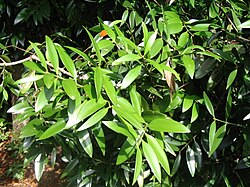| Agathis borneensis | |
|---|---|
 | |
| Scientific classification | |
| Kingdom: | Plantae |
| Clade: | Tracheophytes |
| Clade: | Gymnospermae |
| Division: | Pinophyta |
| Class: | Pinopsida |
| Order: | Araucariales |
| Family: | Araucariaceae |
| Genus: | Agathis |
| Species: | A. borneensis |
| Binomial name | |
| Agathis borneensis | |
| Synonyms [2] | |
| |
Agathis borneensis, also known as Borneo kauri, [3] is a species of conifer in the family Araucariaceae.
